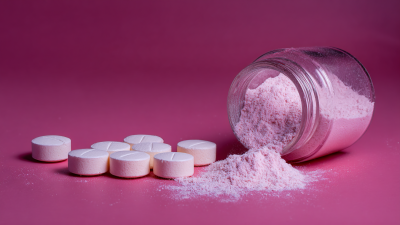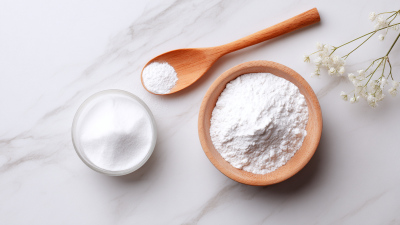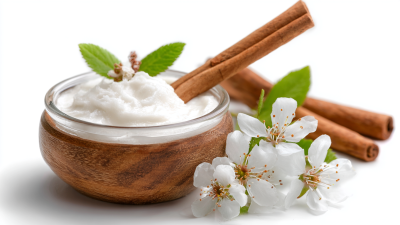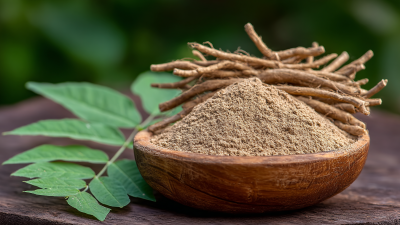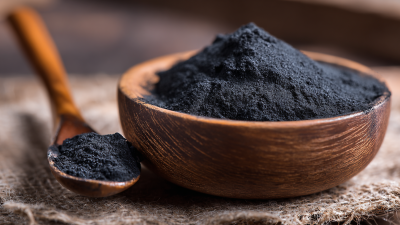In recent years, the demand for natural and effective skincare ingredients has surged, driving brands to seek out active compounds that deliver visible results while ensuring safety. One such ingredient gaining recognition is Alpha Arbutin Powder, a naturally occurring derivative of hydroquinone, renowned for its skin-brightening properties. According to the latest market reports, the global skincare ingredient market is expected to reach USD 23.3 billion by 2025, with a significant shift towards innovative formulations featuring high-performance actives like Alpha Arbutin. This compound has been shown to inhibit melanin production, making it a popular choice among formulators aiming to cater to consumers seeking solutions for hyperpigmentation and skin tone irregularities. As we delve into the ways to enhance skincare formulations with Alpha Arbutin Powder, we will explore its benefits, usage guidelines, and how to incorporate it effectively into your product lineup.

Alpha arbutin is becoming a popular ingredient in skincare formulations, particularly for its remarkable ability to brighten the skin and reduce hyperpigmentation. This naturally occurring derivative of hydroquinone is a compelling choice for anyone seeking a gentle yet effective solution for uneven skin tone. Its ability to inhibit melanin production while being kinder to sensitive skin makes it an attractive option for formulations aimed at diverse skin types.
The benefits of alpha arbutin extend beyond mere brightening; it also boasts hydrating properties that contribute to overall skin health. By enhancing moisture retention, alpha arbutin promotes a plump and youthful complexion. In recent trends, minimalist skincare brands have started to incorporate such potent ingredients into their offerings, catering to consumers who prefer clean and effective formulations without harsh additives. Whether through serums or moisturizers, using alpha arbutin powder in your skincare routine could unlock the potential for a more radiant and even-toned appearance.

When it comes to incorporating alpha arbutin powder into your skincare formulations, selecting the right base is crucial for maximizing its effectiveness. This powerful ingredient works best in water-based formulations, where it can remain stable and deliver enhanced skin-brightening benefits. When choosing your carrier, consider formulations like serums or gels that provide a lightweight texture, allowing for better absorption of the ingredient. Additionally, maintaining a pH level between 4.5 and 7 is essential to ensure that alpha arbutin remains stable and effective, preventing any degradation that could occur at extreme pH levels.
Another best practice for incorporating alpha arbutin powder is to combine it with synergistic ingredients that can enhance its effects. Vitamin C or niacinamide, for example, can work in harmony with alpha arbutin, improving overall skin tone and texture. Be mindful of the order in which these ingredients are mixed; typically, water-soluble ingredients should be combined first before adding alpha arbutin. Lastly, conduct stability tests to ensure that your final formulation maintains its potency over time, and don’t forget to educate your customers on proper usage to achieve the best results.
| Formulation Type | Usage Rate (%) | pH Range | Main Benefits | Formulation Tips |
|---|---|---|---|---|
| Serum | 1-2% | 4.5 - 6.0 | Brightening, Anti-hyperpigmentation | Combine with Vitamin C for enhanced effects. |
| Cream | 0.5-1% | 5.0 - 6.5 | Moisturizing, Skin Tone Evening | Stir gently to avoid bubbles. |
| Lotion | 0.5-1.5% | 4.5 - 7.0 | Softening, Brightening | Consider emulsifying agents for stability. |
| Face Mask | 1-3% | 4.0 - 6.5 | Exfoliating, Brightening | Use with clay or charcoal for detoxifying effect. |
| Toner | 0.2-0.8% | 4.5 - 5.5 | Refreshing, Brightening | Apply after cleansing for best results. |
When integrating alpha arbutin powder into your skincare formulations, the key is to ensure it blends seamlessly with other ingredients for optimal effectiveness. One effective technique is to dissolve the alpha arbutin powder in a suitable solvent, such as distilled water or glycerin, before adding it to your formulation. This not only enhances its solubility but also maximizes its absorption capabilities in the skin. Make sure to monitor the temperature during this process, as high heat can deactivate the compound.
Another important tip is to incorporate alpha arbutin into the cool-down phase of your formulations. This means adding it after you've emulsified your oils and waters but before the mixture cools down completely. This method helps maintain its stability and ensures you retain the maximum potency of the alpha arbutin, allowing your skincare product to deliver the brightening benefits effectively.
Lastly, consider combining alpha arbutin with other complementary ingredients like niacinamide or vitamin C. These powerful antioxidants work synergistically, enhancing each other’s efficacy while providing additional skin benefits. Just be mindful of formulation pH levels to ensure that all active ingredients remain stable and effective for the best results in your skincare products.
When incorporating Alpha Arbutin into skincare formulations, preserving its stability is crucial for maintaining efficacy. Studies indicate that Alpha Arbutin can become unstable in formulations exposed to high temperatures and varying pH levels. Thus, it’s essential to control these factors to enhance the performance of your products. According to a report by the Journal of Cosmetic Science, optimal stability is achieved at a pH range of 4.0 to 7.0, making it critical to monitor pH during the formulation process.

Tip 1: Store your formulations in a cool, dry place to prevent temperature fluctuations that could destabilize Alpha Arbutin. Additionally, consider using air-tight packaging to limit exposure to light and oxygen, as these elements can also degrade the compound over time.
Tip 2: Incorporate stabilizers such as Vitamin E, which has been shown to enhance the stability of Alpha Arbutin, particularly in oil-based formulations. The International Journal of Cosmetic Science suggests including antioxidants that can protect against oxidative stress, extending the shelf life of your products.
Tip 3: Regularly test your formulations for stability over time, using techniques such as accelerated aging studies, to ensure that your Alpha Arbutin remains potent and effective for consumers. Implementing these practices will help you create high-quality skincare products that meet market demands.
Alpha arbutin powder is gaining traction in skincare formulations, particularly for addressing hyperpigmentation issues that are prevalent among diverse skin types, including those in India. Its ability to inhibit melanin production makes it an ideal ingredient in serums aimed at lightening dark spots and even skin tone. According to a report by the International Journal of Cosmetic Science, products containing alpha arbutin can reduce hyperpigmentation by up to 30% over 12 weeks of use when combined with effective delivery systems. This positions it as a strong alternative to other popular ingredients like kojic acid, which has been trending yet can lead to misuse among consumers.
Many emerging homegrown skincare brands in India are now incorporating alpha arbutin in their formulations to meet the unique needs of Indian skin. These products are designed not just to brighten but also to improve overall skin health, standing out in a market previously dominated by international brands. As consumer awareness grows, marketing strategies highlighting these effective, local alternatives help solidify the reputation of Indian brands in creating potent serums. For example, recent launches have shown promising results, with some serums becoming favorites for targeting post-summer skin discoloration, further emphasizing the relevance of alpha arbutin in contemporary skincare.
This chart illustrates the concentration of Alpha Arbutin Powder in various skincare products. It highlights the growing trend of using this effective ingredient, which is known for its skin brightening properties.
